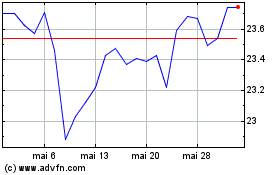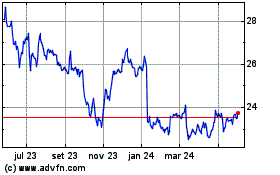U.S. index futures rose in premarket trading on Tuesday,
suggesting a rebound after earlier declines caused by rising bond
yields and oil prices. Investors await key economic data this week
amid statements from Federal Reserve leaders.
At 5:48 AM ET, Dow Jones (DOWI:DJI) futures rose 62 points or
0.15%. S&P 500 futures gained 0.37%, and Nasdaq-100 futures
advanced 0.42%. The 10-year Treasury yield was at 4.016%.
In commodities, West Texas Intermediate crude for November fell
1.91% to $75.67 per barrel, while Brent for December dropped 1.84%
to $79.44 per barrel.
Oil prices fell as traders took profits despite a recent rally
driven by fears of a regional war in the Middle East. The previous
rally was fueled by concerns about oil supply disruptions due to
escalating conflict.
The National Development Commission remains confident in its
annual goals despite concerns about reduced demand in China. In the
U.S., Hurricane Milton shut down a platform in the Gulf of Mexico,
and investors await oil inventory data, expecting a 1.9 million
barrel increase by October 4.
Iron ore and base metal prices fell after a briefing by China’s
National Development and Reform Commission offered no new promises
of economic stimulus. Investors had hoped for more measures after a
holiday, but disappointment led to sell-offs, reflecting concerns
over the economic recovery.
On today’s U.S. economic agenda, at 3 AM ET, Fed Governor
Adriana Kugler spoke in Europe, emphasizing that the U.S. central
bank must remain focused on reducing inflation to 2% while avoiding
an economic slowdown. She supports further rate cuts if inflation
continues to improve.
The NFIB’s September optimism index will be released at 6 AM ET,
with a forecast of 91.6. The U.S. trade deficit for August will be
announced at 8:30 AM ET, with expectations of -$70.8 billion. At
12:45 PM ET, Atlanta Fed President Raphael Bostic speaks, followed
by Federal Reserve Vice Chair Philip Jefferson at 7:30 PM ET.
Asia-Pacific markets closed mostly lower. Mainland China stocks
returned from a holiday with a strong initial rally, driven by
expectations of economic stimulus, but lost momentum. The lack of
concrete details from Beijing disappointed investors. China’s CSI
300 closed up 5.93%, while the Hang Seng dropped 9% in the final
hour of trading, reflecting profit-taking and a lack of new
stimulus measures.
Japan’s Nikkei 225 fell 1%, with the Topix declining 1.47%.
South Korea’s Kospi dropped 0.61%, while the Kosdaq lost 0.35%.
Australia’s S&P/ASX 200 fell 0.35%.
Zheng Shanjie, president of China’s National Development and
Reform Commission, stated that the country would accelerate the
issuance of special bonds to support regional economies and
announce a 100 billion yuan investment plan. However, without
significant new stimulus, investors were disappointed, affecting
the Chinese market.
In the U.S., investors directed $5.2 billion into China-focused
ETFs during the country’s Golden Week holiday, spurred by Beijing’s
stimulus packages, such as interest rate cuts and bank liquidity.
The weekly inflow surpassed the average outflow of $83 million in
2024, generating optimism about economic recovery.
China’s recent actions to revitalize the real estate market
resulted in an immediate increase in sales and buyer interest
during the holiday. However, the sustainability of this recovery
remains uncertain. Showroom visitors increased by 50% compared to
last year, but developer stocks fell due to the lack of new
measures in economic planning.
According to a Reuters poll, South Korea’s central bank is
expected to cut its interest rate by 25 basis points to 3.25% on
Friday, as inflation dropped to 1.6%. Economists predict this will
be the only rate cut of the year, as the bank remains concerned
about rising debt and financial stability in the housing
market.
In Japan, inflation-adjusted wages fell 0.6% in August, while
household spending also decreased by 1.9%. Base pay rose 3.0%
compared to August 2023, and bonus payments increased by 2.7%.
Saudi Arabia’s sovereign wealth fund sold its stake in
Nintendo, reducing it from 8.58% to 7.54%, despite
an executive previously suggesting the possibility of increasing
investment. The sale occurred between August 21 and October 1, as
the government seeks to diversify its economy by investing in
gaming companies.
Hyundai Motor India’s IPO will open for
subscriptions on October 14, with a price range of 1,865 to 1,960
rupees per share, valuing the company at up to $19 billion. This $3
billion IPO marks Hyundai’s first listing outside South Korea and
the first automaker to go public in India in two decades.
European markets are trading lower on Tuesday, with investors
concerned about the impact of Middle Eastern conflict on oil
prices, supply chains, and the global economy. Markets will also be
watching for statements from European Central Bank and Federal
Reserve officials and the release of Germany’s industrial
production data for August.
The UK may ease market access for specialized trading houses
without retail deposits, according to the head of the Financial
Conduct Authority. The regulator seeks to promote wholesale trading
and increase liquidity while simplifying the fundraising process
for listed companies.
Mining and domestic goods sectors are among the most affected,
while luxury stocks also fell due to uncertainty over Chinese
demand.
Among individual stocks, Vistry Group Plc
(LSE:VTY) faces its biggest drop in eight years after announcing
that its adjusted profit would be £80 million lower than expected.
The company identified cost underestimation in one of its divisions
and launched an independent review, with shares down about 29%.
Shares of European distilleries fell after China announced
anti-dumping tariffs on EU cognac, heightening trade tensions.
Remy Cointreau (EU:RCO) dropped up to 8.6%,
Pernod Ricard (EU:RI) 4.3%, and
LVMH (EU:MC) as much as 4.8%. The decision follows
EU tariffs on Chinese electric vehicles.
Shares of Siemens (TG:SIE) fell around 1.6%
after announcing the acquisition of Denmark-based Danfoss Fire
Safety to expand its sustainable portfolio. The subsidiary will
integrate into Siemens’ smart infrastructure division. The company
will continue to operate independently, with the transaction
expected to close by the end of 2024.
On Monday, U.S. markets closed lower, impacted by geopolitical
uncertainty in the Middle East. The Dow lost 0.94%, the S&P 500
fell 0.56%, and the Nasdaq dropped 1.18%. The dollar hit a
seven-week high against the yen, driven by strong U.S. job data,
which reinforced economic resilience but reduced expectations for
aggressive Federal Reserve rate cuts. Consumer credit in August
rose less than expected, increasing by $8.9 billion, below the
forecast of $12 billion.
John Williams, president of the New York Federal Reserve, stated
that reducing rates “over time” would be appropriate following the
half-point cut in September, noting that current monetary policy is
well-calibrated.
Alberto Musalem, president of the St. Louis Federal Reserve,
also supports gradual rate cuts, emphasizing the need for caution
to avoid excess in easing. He expects inflation to return to 2%
soon and considers the labor market consistent with a strong
economy.
Quarterly reports from
PepsiCo (NASDAQ:PEP)
and Accolade (NASDAQ:ACCD) are expected
before the market opens.
After the close, Saratoga Investment
Corp (NYSE:SAR) will release its numbers.
Saratoga Investment (NYSE:SAR)
Gráfico Histórico do Ativo
De Dez 2024 até Jan 2025

Saratoga Investment (NYSE:SAR)
Gráfico Histórico do Ativo
De Jan 2024 até Jan 2025
